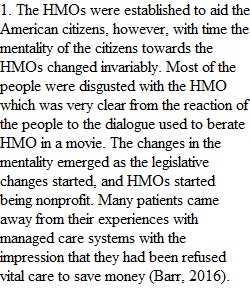


Q Chapter 9 The Increasing Role of For-Profit Health Care There was a rapid shift to for-profit health care initially seen in the 1990s and it affected the delivery of care today. The author considers the effects of the increasing prevalence of for-profit hospitals and specialized for-profit treatment centers for conditions such as heart disease and kidney disease. He also questions the extent to which physicians have allowed the profit motive to affect their professional practice. This chapter will provide an overview of the effects of HMO and for-profit managed care as it pertains to the perceived quality of care. 1) In a well-developed essay, discuss some of the different perceptions Americans held about HMOs (both correct and incorrect). How do the earlier ideas about HMOs compare to the way we perceive HMOs today? Similar to the first question, draw from the book to set up your discussion. Do not simply repeat with the author wrote but use it to consider current perceptions. 2) As health care in the U.S. enters an age of increasingly scarce resources, and as our society reexamines its fundamental assumptions about the role and limits of care, what ethical and legal provisions should be considered in For-Profit health care? Are we moving in the right direction with For-Profit Care under the ACA? Answers are due by Friday (midnight) and five student response posts are due by Saturday (midnight). Bibliography and citations required.
View Related Questions